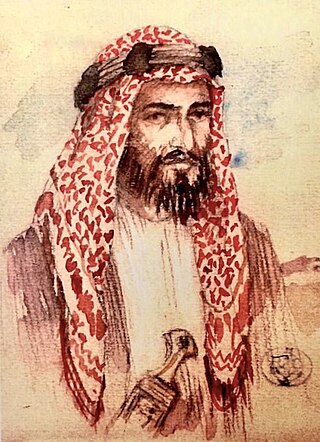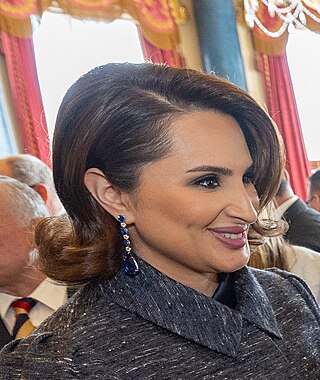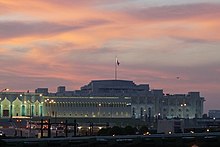
The emir of the State of Qatar is the monarch and head of state of the country. The emir is also the commander-in-chief of the Armed Forces and guarantor of the Constitution. The emir holds the most powerful position in the country, and has a prominent role in foreign relations.

The national emblem of Qatar is one of the official symbols of the state of Qatar. The emblem was initially adopted six years after the termination of the British protectorate, with the gained independence as a country under Sheikh Ahmad bin Ali Al Thani, and was designed under the reign the Emir of Qatar Khalifa bin Hamad Al Thani in 1976.

The Doha Corniche is a waterfront promenade and dual carriageway extending for seven kilometres (4.3 mi) along the crescent-shaped Doha Bay in Qatar's capital city, Doha. A lush, semi-circular linear public space, the Corniche serves as the central location for national celebrations, including Qatar National Day Parade and National Sports Day, as well as various religious, civic, and sporting events, making it one of the most popular tourist and recreational destinations in Qatar.

Sheikh Jassim bin Mohammed Al Thani, also known as "The Founder", was the founder of the State of Qatar. He had a total of 56 children, 19 sons and 37 daughters.

Abdullah bin Jassim bin Mohammed Al Thani, also known as Sheikh Abdullah bin Jassim Al Thani or Sheikh Abdullah bin Qassim Al Thani, was the Emir of Qatar. He was born in 1880 in Doha, the capital city of Qatar. He then abdicated in favour of his crown prince and second son, Sheikh Hamad bin Abdullah Al Thani, in 1940. Sheikh Hamad died eight years later and Sheikh Abdullah assumed office once again until 1949, when he stepped down from office in favour for his eldest son, Sheikh Ali bin Abdullah Al Thani. Oil was also discovered for the first time during his rule.
Sheikh Mohammed bin Thani, also known as Mohammed bin Thani bin Mohammed Al Thamir, was the first Hakim (ruler) of the whole Qatari Peninsula, officially being recognized by the British in September 1868 following a meeting with British representative Lewis Pelly. He is known for being the father of Sheikh Jassim bin Mohammed Al Thani, the founder of Qatar and who fended off the Ottoman army in the late 19th century.

Al Bidda is a neighborhood of Doha, Qatar. It was previously the largest town in Qatar in the 19th century, before Doha, an offshoot of Al Bidda, grew in prominence. Al Bidda was incorporated as a district in the Doha municipality in the late 20th century.

Doha is the capital city and main financial hub of Qatar. Located on the Persian Gulf coast in the east of the country, north of Al Wakrah and south of Al Khor and Lusail, it is home to most of the country's population. It is also Qatar's fastest growing city, with over 80% of the nation's population living in Doha or its surrounding suburbs, known collectively as the Doha Metropolitan Area.
Qatar was a British protectorate from 1916 till it gained independence on 3 September 1971.
The Amiri Diwan of Kuwait serves as the royal court of the Emir of Kuwait.

Abdullah bin Hamad bin Khalifa Al Thani is the Deputy Emir of the State of Qatar and unofficial heir presumptive to Emir of Qatar.

Saoud bin Abdulrahman Al Thani is the Deputy Prime Minister and Minister of State for Defence Affairs in Qatar.
The following is a timeline of the history of the city of Doha, Qatar.

Msheireb Downtown Doha is a planned city in Doha, Qatar being constructed in place of the current district of Mushayrib. It is promoted as being the world's first sustainable downtown regeneration project and one of the smartest cities on earth, strategically located in the heart of Doha. Initial construction began in January 2010. Located in the downtown area of Qatar's capital city, it is set to occupy 310,000 sq m with the total cost of construction amounting to approximately $5.5 billion. It was launched in six phases by Msheireb Properties, a subsidiary of Qatar Foundation.

The Old Amiri Palace, located in Doha, Qatar, previously served as the residence of Sheikh Abdullah bin Jassim Al Thani during the early 20th century. It became defunct in 1923 when Abdullah bin Jassim shifted his seat of government to the then-abandoned Ottoman fort of Qal'at al-Askar. In 1972, it was decided that it would be converted into a museum, culminating in the Qatar National Museum.

Sheikh Khalid bin Khalifa bin Abdul Aziz Al Thani is a Qatari politician who has served as Prime Minister of Qatar from 28 January 2020 to 7 March 2023 and Minister of the Interior since 28 January 2020.

Sheikha Jawaher bint Hamad bin Suhaim Al Thani is a Qatari royal and the first wife and consort of Tamim bin Hamad Al Thani, the Emir of Qatar. A member of the Qatari royal family by birth, she is the daughter of former government minister Sheikh Hamad bin Suhaim Al Thani and a grandniece of Emir Khalifa bin Hamad Al Thani. She is a second cousin of her husband. As the first wife of the Emir, she accompanied him on an official state visit to Spain in 2022, where she was presented with the Royal Order of Isabella the Catholic by King Felipe, and to the coronation of King Charles III and Queen Camilla in 2023.

Abdulrahman bin Hamad bin Jassim bin Hamad Al Thani is the Qatari Minister of Culture. He was appointed as minister on 19 October 2021.
Ibrahim bin Ali bin Issa Al Hassan Al Mohannadi is the Qatari Minister of Justice and Minister of State for Cabinet Affairs. He was appointed as minister on 8 January 2024.
















